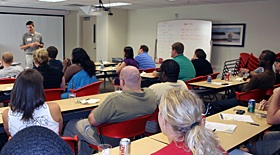Biddix Pioneers Innovative Educational Research
March 22, 2011
11-60
Biddix Pioneers Innovative Educational Research

|
VALDOSTA -- For the past five years, Dr. J. Patrick Biddix has
been asking questions.
The inquisitive and energetic associate professor has sought to
understand the role women play in contemporary college activism,
the relationship between leadership and technology, and the various
paths to becoming a Senior Student Affairs Officer (SSAO). His
probing has resulted in nearly 20 peer-reviewed journal articles
and a handful of major, ongoing research studies.
“My research agenda focuses on civic engagement outcomes,
technology and implications, and career development. Linking each
is research related to collegiate and professional women’s
development,” said Biddix, who has grown the Higher Education
Leadership program from eight to 40 students during his five years
as program coordinator. “Like many people, I believe the world is
changing -- certainly in the way we communicate and form
relationships. I think how we work and play in college can have
significant implications for how we work and play as future
citizens.”
The Power of Technology
Civic engagement and campus activism are among his main research
interests. The father of two is working on a book about student
technology use and its relation to campus activism and future
leadership endeavors.
“What I hope is that as educators (faculty, staff, advisors), we
are helping students understand the need to reflect on what
adopting technology means in a changing global landscape,” said
Biddix, who was awarded the College of Education’s Faculty
Excellence in Professional Service Award in 2009. “At the moment,
I've seen women more in tuned with relational aspects of technology
-- using it as a means to get and stay connected, rather than
simply as a means to send mass messages. I think this perspective
best positions them as effective leaders in a society increasingly
more dependent on information communication technologies.”
Analyzing Career Paths
Biddix has spent the past several years interviewing SSAOs,
particularly women and minorities, to engage in one of the most
comprehensive studies to examine the possible paths to becoming an
SSAO. So far, Biddix has determined that aspirants may expect an
average of 20 years of field experience and six moves with job
changes about every three years. Merging academic and student
affairs experience proved beneficial for all career paths, from
residential life to student activities.
“Until recently, 80 percent of the SSAOs have been men -- mostly
white men. At the same time, since the 1980s, women have
outnumbered men in college and people of color have made
significant gains in college attendance. Unfortunately, our
leadership hasn't mirrored this,” Biddix said. “I think anyone can
be an effective educator, but having someone who looks like you
really does make a difference. This research offers some guidance
about career path choices where there was previously only
speculation.”
Fraternity Leadership Outcomes
As editor for the Association of Fraternity/Sorority Advisors
research journal, Oracle, Biddix has also been engaged in a
ten-year study to determine individual outcomes of being a part of
a fraternity central office leadership program. With aid from
graduate assistant Rachel Underwood, Biddix found that 62 percent
of attendees became active officers or volunteers and more than
eight percent became donors later in life. Many attendees continued
to live the organization’s principals as well as appreciate the
associations made as a result of their participation.
Commitment to Collaboration
Biddix’s intense research load has not hindered his contributions
to the university. Last year, the 32-year-old established a Student
Affairs Track within the Higher Education Leadership Program, which
resulted in the addition of a tenure-track position and 15 graduate
assistantships deployed throughout the Division of Student Affairs.
Biddix was appointed to the Mission and Statement Task Force as
well as the Strategic Plan Subcommittee on Research and
Scholarship. He is the vice chair of Valdosta State’s Institutional
Review Board and has served on various faculty search
committees.
He is known for seeking out collaborative opportunities with a
variety of university offices and departments. Students in nearly
all of his courses have conducted research or established ties with
academic and student affairs realms. Graduate students in a recent
research course conducted focus groups to assess the effectiveness
of a variety of campus programs and services, from orientation to
the Student Recreation Center. The relationships aided his students
in honing their research skills, while providing departments with
actionable data.
Newsroom
- Office of Communications Powell Hall West, Suite 1120
-
Mailing Address
1500 N. Patterson St.
Valdosta, GA 31698 - General VSU Information
- Phone: 229.333.5800
- Office of Communications
- Phone: 229.333.2163
- Phone: 229.333.5983